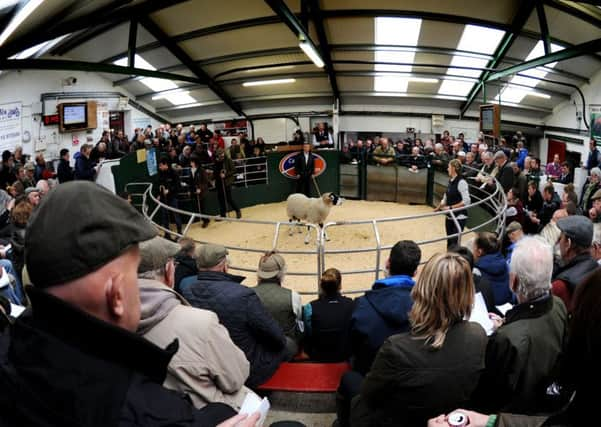Malcom's sale preparations are all about Swaledales in Hawes


Those not associated with agriculture may assume these are humble creatures grazed and shown by poor farmers who are carrying on a tradition and a way of life rather than a business but nothing could be further from the truth.
Last week, Swaledale sheep breeders and purchasers came together in their hundreds to transform the small market town of Hawes into a rural metropolis for two days in the form of the annual Swaledale Sheep Breeders Association’s ram sales, known as tup sales throughout the farming world.
Advertisement
Hide AdAdvertisement
Hide AdPrices paid are the same as for a new car and the reason is simple. The Swaledale is known as the UK’s premier hill sheep breed and plays a prominent role in the breed world. These hardy sheep from the hills provide the basis for lowland sheep to thrive due to their hardiness and mothering ability.
Malcolm Allison is chairman of the B District of the Swaledale Sheep Breeders Association and was preparing for the tup show and sales held on Wednesday and Thursday when I met him on Monday.
Malcolm farms at Seal Houses in Arkengarthdale and at Cogden Hall in Grinton near Reeth in partnership with his brother Laurence and nephews Christopher and Stephen. His other brother Alan passed away in December last year. The family runs a flock of 700 pure Swaledales and 500 crossed to produce the North of England Mule by using the Blue Faced Leicester tup.
“The Swaledale is the main hill breed to bring about the North of England Mule, which is the most popular down country breed. You often find down country men will try different breeds for a year or two and then come back to the Swaledale mostly because of the mothering ability. That’s because Swaledale sheep will have two lambs and look after them whereas other hill breeds that have two may only look after one and in poor weather might not even look after that.
Advertisement
Hide AdAdvertisement
Hide Ad“The Swaledale is very maternal. That’s why the other hill breeders will come and buy a Swaledale tup to cross back on to their breed to reinstate the mothering ability.”
Malcolm trades tups at the annual sales. A week ago he bought a ram at Kirkby Stephen’s annual sale and since he normally buys three or four new tups a year he had buying in mind when I visited.
“The only sheep we buy are rams and we are all looking to purchase something that will improve our flocks. When I’m looking it’s a good big carcase I’m after with a leg on each corner.”
The term ‘a leg on each corner’ isn’t some kind of farming humour, it’s a critical part of the analysis that everything should be right with the tup as he has a fair amount of exercise to get through with each ram serving up to 100 ewes usually in a matter of 10 days so lambing takes place at the farmer’s allotted time.
Advertisement
Hide AdAdvertisement
Hide Ad“We buy them as big as possible and once we’ve brought them home we hold them back from the ewes until November 12. Some will use them straight away but since we’re a bit higher up here at between 1,200-1,800ft our lambing time is just a little later starting around April 10. Our Leicesters and Mules start from mid-March.”
While Malcolm believes his Swaledales may not be quite at the top of the league at present he is always trying to improve.
“We had a tup that made £80,00 last year and we have had one at £17,000. The tup I bought last week at Kirkby Stephen cost £8,000. At the sales you aim to buy as good an animal as you can for as little money as possible.”
There was a time when if you had a name in the breeding world your stock would automatically be sold higher. Malcolm tells of those days having changed.
Advertisement
Hide AdAdvertisement
Hide Ad“I don’t think that’s the case today. If your tups are good enough they will sell and it doesn’t matter what your name is.”
GRAND SCALE OF ANNUAL SALE
Hawes’ population of 1,137 is estimated to double during the breed sales season in September and October.
Malcolm took over as B District chairman from his uncle William Allison 15 years ago and organises the stewards for the sale at Hawes Auction Mart.
The top price ever paid for a Swaledale tup was £101,000, which was bought, as many are, by a syndicate.
Advertisement
Hide AdAdvertisement
Hide AdThe family farming business of J Allison & Sons, named after Malcolm’s father John, includes 600 acres and in addition to the Swaledale and Swaledale cross flocks they have a pedigree flock of 30 Blue Faced Leicesters and a herd of 80 commercial cattle.